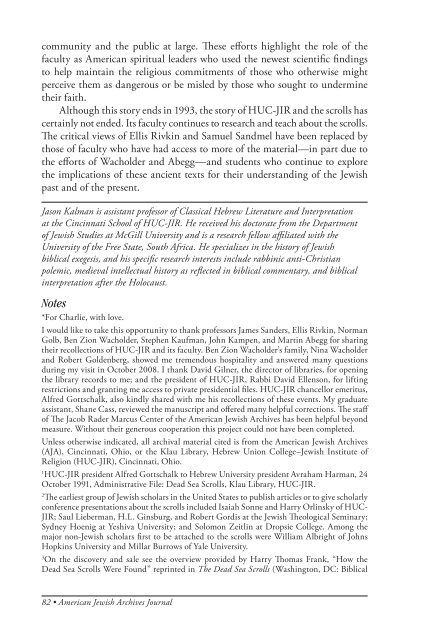The American Jewish Archives Journal, Volume LXI 2009, Number 1
The American Jewish Archives Journal, Volume LXI 2009, Number 1
The American Jewish Archives Journal, Volume LXI 2009, Number 1
Create successful ePaper yourself
Turn your PDF publications into a flip-book with our unique Google optimized e-Paper software.
community and the public at large. <strong>The</strong>se efforts highlight the role of the<br />
faculty as <strong>American</strong> spiritual leaders who used the newest scientific findings<br />
to help maintain the religious commitments of those who otherwise might<br />
perceive them as dangerous or be misled by those who sought to undermine<br />
their faith.<br />
Although this story ends in 1993, the story of HUC-JIR and the scrolls has<br />
certainly not ended. Its faculty continues to research and teach about the scrolls.<br />
<strong>The</strong> critical views of Ellis Rivkin and Samuel Sandmel have been replaced by<br />
those of faculty who have had access to more of the material—in part due to<br />
the efforts of Wacholder and Abegg—and students who continue to explore<br />
the implications of these ancient texts for their understanding of the <strong>Jewish</strong><br />
past and of the present.<br />
Jason Kalman is assistant professor of Classical Hebrew Literature and Interpretation<br />
at the Cincinnati School of HUC-JIR. He received his doctorate from the Department<br />
of <strong>Jewish</strong> Studies at McGill University and is a research fellow affiliated with the<br />
University of the Free State, South Africa. He specializes in the history of <strong>Jewish</strong><br />
biblical exegesis, and his specific research interests include rabbinic anti-Christian<br />
polemic, medieval intellectual history as reflected in biblical commentary, and biblical<br />
interpretation after the Holocaust.<br />
Notes<br />
*For Charlie, with love.<br />
I would like to take this opportunity to thank professors James Sanders, Ellis Rivkin, Norman<br />
Golb, Ben Zion Wacholder, Stephen Kaufman, John Kampen, and Martin Abegg for sharing<br />
their recollections of HUC-JIR and its faculty. Ben Zion Wacholder’s family, Nina Wacholder<br />
and Robert Goldenberg, showed me tremendous hospitality and answered many questions<br />
during my visit in October 2008. I thank David Gilner, the director of libraries, for opening<br />
the library records to me; and the president of HUC-JIR, Rabbi David Ellenson, for lifting<br />
restrictions and granting me access to private presidential files. HUC-JIR chancellor emeritus,<br />
Alfred Gottschalk, also kindly shared with me his recollections of these events. My graduate<br />
assistant, Shane Cass, reviewed the manuscript and offered many helpful corrections. <strong>The</strong> staff<br />
of <strong>The</strong> Jacob Rader Marcus Center of the <strong>American</strong> <strong>Jewish</strong> <strong>Archives</strong> has been helpful beyond<br />
measure. Without their generous cooperation this project could not have been completed.<br />
Unless otherwise indicated, all archival material cited is from the <strong>American</strong> <strong>Jewish</strong> <strong>Archives</strong><br />
(AJA), Cincinnati, Ohio, or the Klau Library, Hebrew Union College–<strong>Jewish</strong> Institute of<br />
Religion (HUC-JIR), Cincinnati, Ohio.<br />
1 HUC-JIR president Alfred Gottschalk to Hebrew University president Avraham Harman, 24<br />
October 1991, Administrative File: Dead Sea Scrolls, Klau Library, HUC-JIR.<br />
2 <strong>The</strong> earliest group of <strong>Jewish</strong> scholars in the United States to publish articles or to give scholarly<br />
conference presentations about the scrolls included Isaiah Sonne and Harry Orlinsky of HUC-<br />
JIR; Saul Lieberman, H.L. Ginsburg, and Robert Gordis at the <strong>Jewish</strong> <strong>The</strong>ological Seminary;<br />
Sydney Hoenig at Yeshiva University; and Solomon Zeitlin at Dropsie College. Among the<br />
major non-<strong>Jewish</strong> scholars first to be attached to the scrolls were William Albright of Johns<br />
Hopkins University and Millar Burrows of Yale University.<br />
3 On the discovery and sale see the overview provided by Harry Thomas Frank, “How the<br />
Dead Sea Scrolls Were Found” reprinted in <strong>The</strong> Dead Sea Scrolls (Washington, DC: Biblical<br />
82 • <strong>American</strong> <strong>Jewish</strong> <strong>Archives</strong> <strong>Journal</strong>

















